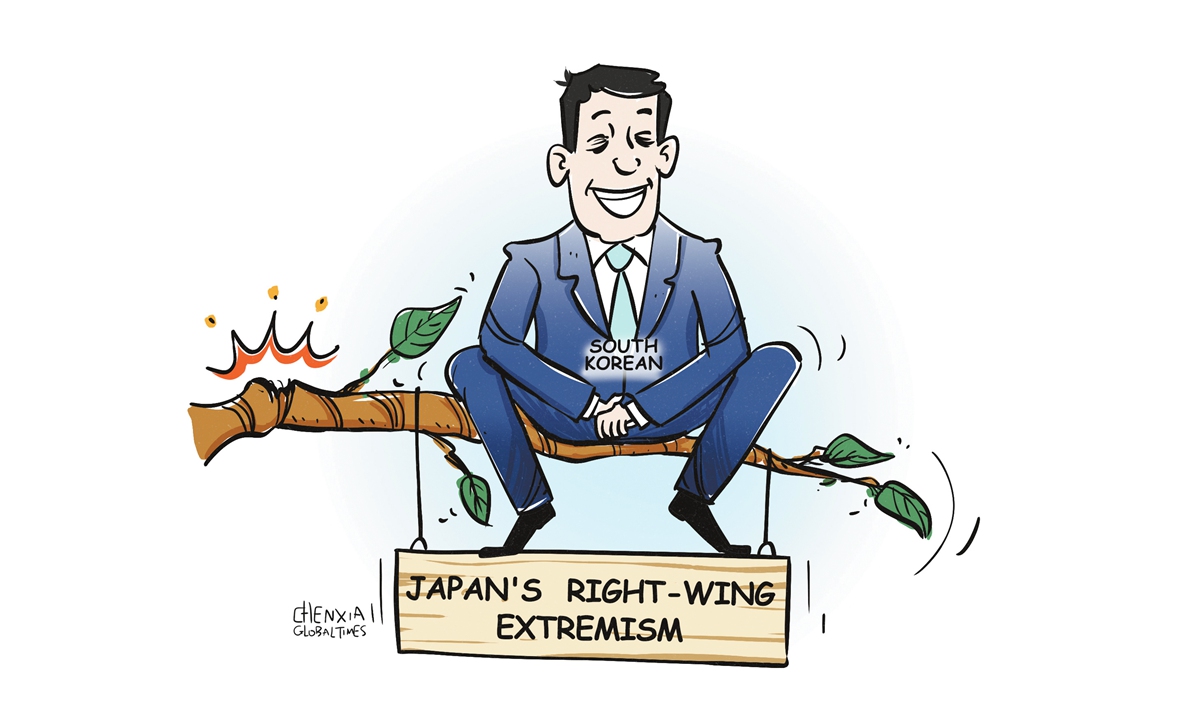
Illustration: Chen Xia/GT
Recently,
the internal division in South Korea toward Japan has intensified. The South Korean government's comments on the relationship between South Korea and Japan, as well as historical disputes, have sparked strong dissatisfaction among the South Korean opposition party and the public.
According to the Hankyoreh, not only did South Korean President Yoon Suk-yeol not press Japan for an apology for its historical wrongdoings during this year's Liberation Day speech, but South Korea's principal deputy national security adviser, Kim Tae-hyo, also mentioned that "what's important is what lies in the hearts of the Japanese people" when discussing the historical issues between South Korea and Japan. These statements have caused a political storm in South Korea, and concerns and criticisms about the Yoon administration's understanding of historical issues are mounting in society.
Zhan Debin, director and professor of the Center for Korean Peninsula Studies at the Shanghai University of International Business and Economics, told the Global Times that this reflects the deep division within South Korea in its attitude toward Japan. Lee Jae-myung, South Korea's opposition leader, criticized the Yoon administration harshly on social media, accusing it of "whitewashing history for Japan."
Zhan believes that there will be further backlash in public opinion within South Korea if the Yoon administration continues to lean toward Japan in its attitude and policies.
Whether it is Kim's remarks or the explanations from the presidential office, they all speak for Japan from Japan's perspective while ignoring the dissatisfaction within South Korea, further angering South Koreans, Zhan said.
After the Yoon administration took power, South Korea made drastic adjustments in its foreign relations and national security strategy. South Korea immediately accepted and participated in the "Indo-Pacific Strategy" promoted by the US and Japan, rapidly strengthening cooperation with the US and Japan in the military field, while taking a more ideologically hardline stance in its relations with China.
South Korea ceased military exercises near disputed islands, ceased demands for Japan to apologize for historical issues and take corrective actions, and ceased criticism of Japan's militaristic expansionist tendencies. Subsequently, the South Korean government publicly abandoned its demand for the Japanese government to apologize and pay compensation for the forced labor issue during the colonial period, instead it raised a public fund to pay the compensation on its own.
Many South Koreans are disappointed with Japan's "apologies" and efforts to address the trauma caused by colonial rule and wartime atrocities. Zhan believes that in dealing with Japan-South Korea relations, the Yoon administration believes that shared values transcend historical cognitive differences. So, issues such as "comfort women," forced labor, and the glorification of aggression history, which have previously led to bilateral friction between South Korea and Japan, can be set aside in the eyes of the current South Korean government, Zhan said.
In fact, during the Yoon administration, Japan has been running faster and further on the path of right-wing extremism than ever before, Zhan said. Japan is dumping nuclear-contaminated wastewater into the waters near South Korea and promoting militarization. As a neighboring country, the South Korean government should respond to and defend its national interests and the rights of its people. However, disappointingly, the South Korean government has chosen to get too close to the Japanese government and lacks the necessary response and protest against Japan's right-wing extremism.
The South Korean government's attitude toward Japan will not bring back Japan's sincere reflection and peaceful diplomacy, but will only push Japan further and faster down the path of right-wing extremism, ultimately harming South Korea itself and other countries in Asia. This attitude toward Japan will also trigger greater opposition within South Korea, exacerbating social divisions.
